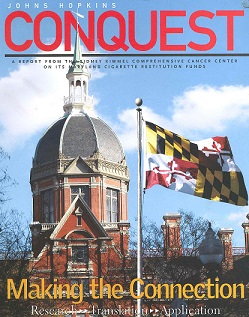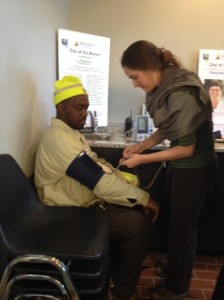This blog is part 3 of 4 of our “Cancer-Free Mondays” series about how the Maryland Cigarette Restitution Fund is helping Maryland Citizens.
 The best way to reduce deaths from cancer is through prevention and early detection. Cancer deaths could be cut in half simply through changes in behaviors associated with cancer development and increased early detection of cancers through cancer screening, experts say. It sounds straightforward enough, but the key to success is in ensuring that our citizens, particularly the poor and underserved, have the information they need and the resources they need to act on the information. This is another area where Johns Hopkins and the Cigarette Restitution Fund (CRF) have joined forces to improve the health of Maryland citizens.
The best way to reduce deaths from cancer is through prevention and early detection. Cancer deaths could be cut in half simply through changes in behaviors associated with cancer development and increased early detection of cancers through cancer screening, experts say. It sounds straightforward enough, but the key to success is in ensuring that our citizens, particularly the poor and underserved, have the information they need and the resources they need to act on the information. This is another area where Johns Hopkins and the Cigarette Restitution Fund (CRF) have joined forces to improve the health of Maryland citizens.
From 2001 through 2010, when Johns Hopkins received a CRF Public Health grant, our physicians, nurses, and health educators provided education on cancer prevention and screening to hundreds of thousands of Marylanders and provided free cancer screenings to thousands more. Building upon CRF community partnerships, our healthcare team earned a federal grant to improve colon cancer screening rates among Medicare recipients. Our physicians also provided colonoscopies to uninsured Baltimore residents through a collaborative initiative under the Baltimore City Public Health Department’s CRF Public Health Grant.
It is not coincidental that the U.S. Centers for Disease Control and Prevention (CDC) reported that Maryland leads the nation in decreased colon cancer incidence rates. It is further proof that action against cancer—in this case colorectal cancer screening—brings results. That same CDC report found that Maryland was among the best in cancer screening overall.
Though Johns Hopkins no longer receives CRF Public Health Grant support, its leadership has maintained and strengthened their commitment to the community. Even before the Affordable Care Act, Johns Hopkins voluntarily joined Priority Partners and became one of seven managed care organizations authorized by the state of Maryland to provide healthcare to our state’s uninsured. Our community outreach and public health experts have expanded the community partnerships established through the CRF and started new programs dedicated to eliminating racial disparities in Maryland’s cancer death rates.
More recently, a small CRF grant has allowed Johns Hopkins to broaden its participation in the Day at the Market program. The program is a bimonthly event that brings nurses and other clinicians, safety experts, and various caregivers to the Northeast Market on Monument Street in East

Baltimore to meet face to face with citizens of Baltimore. A Day at the Market, which has received recognition from the Maryland Department of Health and Mental Hygiene, fosters dialog about prevention and detection of cancer and other diseases and ways to achieve a healthier lifestyle.
The Day at the Market program is about more than health education. It is about addressing the needs of a community and providing citizens with the resources they need to make choices and changes that prevent cancer and other diseases. Johns Hopkins experts say obtaining and maintaining a healthy weight is one of the most important things we can do for our health. A nutritious diet is essential to achieving that goal, and the Northeast Market provides convenient access to fresh and affordable produce and other healthy foods. Johns Hopkins leadership felt so strongly about this health commitment, that the Johns Hopkins University partnered with Baltimore Public Markets Corporation, the City of Baltimore, the State of Maryland, and other groups to help finance a recent $2 million renovation to the market. The renovations include dedicated space for community health outreach and education and broader use of nutrition-friendly menus that provide a green leaf graphic to make healthy menu choices easily recognizable to customers.
We can talk about the value of cancer prevention, but as the old adage says, “Talk is cheap.” Without the tools to understand and adopt healthy behaviors, Johns Hopkins experts and Maryland’s elected officials understand that the dialog is meaningless to many of our citizens. That is why we continue to work together to get the information, the access, and the support to the people of our state.
Cancer Prevention Tips and Resources
Cancer experts say if we do just a few things—applying what we understand today to strengthen cancer prevention—we could cut cancer incidence by more than half. Here’s how:
- Quit smoking
- Maintain a healthy weight and diet
- Limit alcohol consumption
- Exercise regularly Find an activity you enjoy (walking, jogging, dancing) and incorporate 30 minutes of this activity into your daily routine.)
- Protect skin from the sun
- Talk to your doctor about reducing, when possible, medical exposures to radiation (X-rays, etc.)
- Find out about your medical history. Talk to your doctor about a cancer screening and prevention plan.
- Avoid on the job exposures to carcinogens such as asbestos
- Women, talk to your doctor about hormone replacement therapy at menopause and increased breast cancer risk
- Get vaccinated against known cancer-causing viruses.
The hepatitis B vaccine can prevent certain types of liver cancer. The Gardasil vaccine prevents HPV (human papillomavirus) infection, a common sexually transmitted virus that causes the majority of cervical cancers and more than half of oral cancers.
Do you have questions or need help with any of these tips? Visit the Johns Hopkins booth at the Northeast Market on the 2nd Wednesday of each month.
Do you need health insurance? Get help at the Maryland Health Connection.
Part 1: Maryland and Johns Hopkins – A Partnership that Works for Maryland Citizens
Part 2: Maryland and Johns Hopkins - Teaming Up to End Smoking